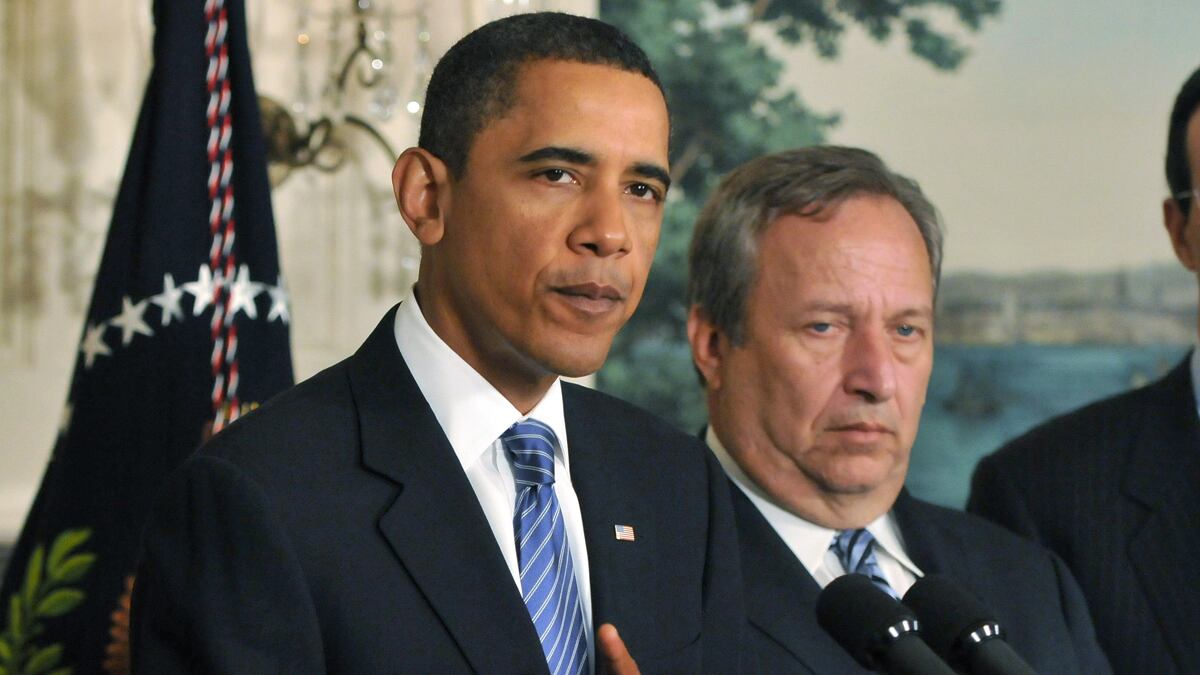Are President Obama’s critics right or wrong about him? Andrew Sullivan jump-started the discussion in a Newsweek cover piece last week, and others, like his colleague David Frum, have weighed in. Whether one thinks the president has been able to successfully grapple with the demands of Washington politics—let alone change the atmosphere—is central to his reelection chances this fall. This week, The New Yorker’s Ryan Lizza has added another major contribution to the debate, after he obtained hundreds of pages of internal memos written to Obama by his advisers over the years, dating back to the beginning of his presidential campaign in 2007. They aggregate into one detailed portrait of the postpartisan ideology that Obama has been trying to cling to, and they also show his evolution into a centrist fighting machine, if only after serious mistakes early on, Lizza argues. Here are some of the best bits.

1. Obama Was Warned About Debt Backlash
One of the documents central to the article is a 57-page memo (read it here) written in 2008 by Larry Summers, then the incoming director of the National Economic Council. He warns the president: “If your campaign promises were enacted … the deficit would rise by another $100 billion annually. The consequence would be the largest run-up in the debt since World War II.” To be fair, Lizza notes that the deficit would also come from many pieces of legislation left over by President Bush—including funding for the Iraq and Afghanistan wars—that Obama would have to sign. Still, the warning posed a dilemma for Obama, who had to rescue the economy with large-scale spending but had campaigned on fiscal restraint.
2. Jostling Over the Stimulus
The White House has since admitted that a stimulus package in 2009 that rivaled the size of the hole in the economy—estimated at around $2 trillion—would have added a much bigger boost. But it wasn’t just fear of congressional Republicans’ veto that limited the sticker price. Summers believed that a larger stimulus would actually make things worse, because an excessive package—one over $1 trillion—would spook the markets. So his memo offered the president only packages of $550 billion, $665 billion, $810 billion, and $890 billion. As the New York Times’s Paul Krugman said, the memo suggests that the administration’s current excuse—that the package should have been larger but politics made that impossible—is not the whole truth. The final price tag for the stimulus was about $787 billion.
3. Going Negative on Hillary
In a campaign memo from October 2007, David Axelrod and other consultants decided that they would have to go after Hillary Clinton’s personality, despite Obama’s disdain for negative campaigns. According to the memo, the slogan “was intended to frame the argument along the character fault line, and this is where we can and must win this fight … Clinton can’t be trusted or believed when it comes to change,” because “she’s driven by political calculation not conviction, regularly backing away and shifting positions ... She embodies trench warfare vs. Republicans, and is consumed with beating them rather than unifying the country and building consensus to get things done. She prides herself on working the system, not changing it,” the memo said.
4. Scaling Back on Health Care
As much as he wanted to change the system and reduce the animosity in Washington, within months of the inauguration President Obama was already being viciously attacked by conservatives and radicals for being a big spender, “political naïf,” socialist, immigrant, arrogant, whiny, “loser”—you name it. He was surprised and not ready for how polarizing and radically partisan Washington is, and the health-care debate would exacerbate this; Obama increasingly scaled back on his ambitions—including in health care—because of the fear of conservative backlash. In January 2010, he rejected a proposal from budget director Peter Orszag and health-care adviser Ezekiel Emanuel to pay federal employees to participate in a pilot program that would determine what the most effective health-care treatments are. It was a low-cost idea that he liked, but Obama wrote in a memo, sounding apologetic, that “unfortunately I think the political guys are right about how it would be characterized,” because any payments to federal employees would be seen as a “luxury” and could be easily caricatured by the right-wing press. “Let’s go back at it in future years, when the temperature on health care and the economy has gone down.”
5. State of the Union
By the State of the Union address in January 2010, the White House was in a slump and Obama was portrayed as a polarizing president. His advisers suggested that he once again assert himself as a fiscally responsible leader—and do so while dissociating himself from Congress because "there has been a resurgence of jaundice about Washington’s ability to deal with these problems responsibly, and a renewed anger over the continued dominance of hyper-partisanship and special interests," they wrote. "It is essential that we use the SOTU to reclaim the high ground on challenging the status quo in Washington … The speech presents a moment when you can begin to distance the Administration from Congress on issues of special interest capture and transparency."
6. Secretary Clinton Rejects Her Budget
One person who was unhappy with the administration’s penny-pinching was Obama’s secretary of state. Clinton rejected the White House’s 2011 budget for the State Department, and wrote a six-page letter detailing her complaints. “We will not have the capacity to deliver either the full level of civilian staffing or the foreign assistance programs that underlie the civilian-military strategy you outlined for Afghanistan; nor the transition from U.S. Military to civilian programming in Iraq; nor the expanded assistance that is central to our Pakistan strategy,” she wrote. “I want to emphasize that I fully understand the economic realities within which this budget is being constructed, and I share your commitment to fiscal responsibility. But I am deeply concerned about these funding levels.”
7. Mastering the Force
Lizza argues that in the end, Obama failed to change the climate of Washington, and was also too slow to embrace the fight—or the recognition that he needed to fight against the GOP. But when he came around, in 2009 and 2010, he mastered partisan politics pretty quickly. "When, in 2009, he was presented with the windfall pot of thirty-five billion dollars that he could spend on one of his campaign priorities or use for deficit reduction, Obama wrote, 'I would opt for deficit reduction, but it doesn’t sound like we would get any credit for it,’” one memo showed. Lizza concludes that the first two years of Obama’s term stand “as one of the most successful legislative periods in modern history,” but not because he was successful in unifying the country and building consensus; rather because he found that “working the system”—which he had accused Clinton of doing, as a negative approach—was not so bad after all.






